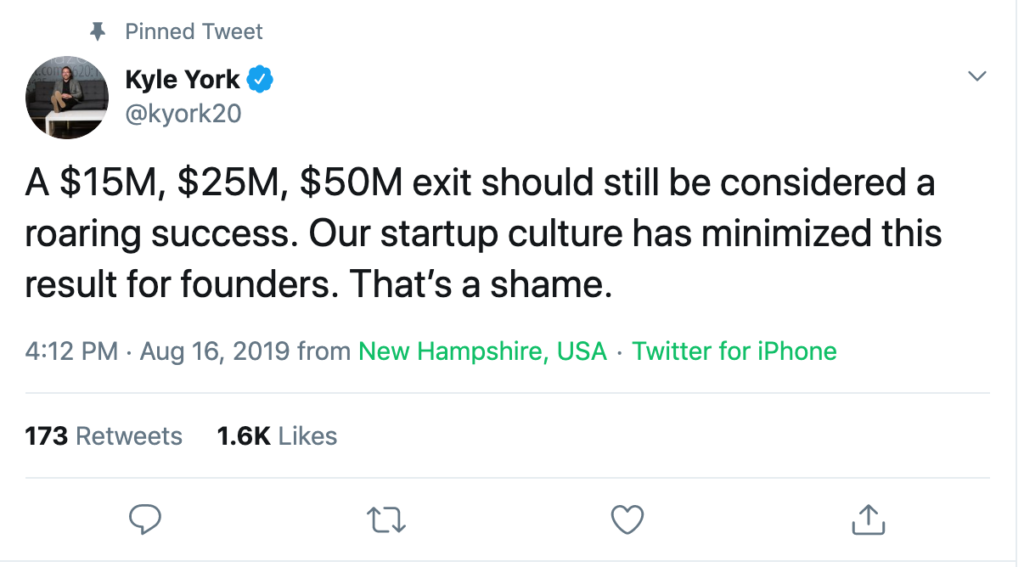Jawad Mian, the founder of Stray Reflections, a global macro research firm, recently tweeted that “from 1997 to 2012, less cash was returned to investors than invested in Venture Capital.” He went on to imply that Venture Capital, in many ways, is a ponzi scheme in which management fees are the actual way venture capitalists make money whether or not the startups they invest in succeed. I’ve been saying something similar a lot recently. I know a ton of investors who make $300-500K per year as investors, but many look more like professional money managers or serial fundraisers. In all walks of life, they’re already rich paying jobs for raising funds and administering them – all before they even find startups, invest capital and/or show returns.
The series of tweets and the hundreds of responses it provoked led to a fascinating discussion on the startup culture that has been created and is being lived by all parties involved – entrepreneurs, venture capital firms, and LPs.
Why we’re different
I have been pretty clear in saying that I think the current model is broken. It is one of the reasons I launched York IE and why we don’t operate with management fees or a traditional fund of any kind. It is one of the reasons we work with entrepreneurs in so many different ways because we want to do what is best for the entrepreneur and what will help their company grow. We never want to make decisions simply because we have capital to deploy.
That is not normal.
Despite being intensely competitive, I have never believed in the win at all cost method. I think in most markets there is room for many “winners” as success is relative to ambition, goals and healthy cap tables! If there can only be one winner in a market then the market is too small.
I invested in a startup that sold for $20 million but the founder still owned 80% of the company at sale. That is a win. But it is not something you’re apt to hear about.
What you will hear about
No, you’re far more likely to read about companies like Uber and WeWork. These companies are built upon hype. Of course, when they do come back down to earth, we hear all the critics. But I don’t necessarily blame these companies. They’re often victims of the system. Just because the venture capital/private equity community inflated or over valued them, doesn’t mean they are horrid businesses or entrepreneurs/CEOs. In fact, these are transformational successes, category definers, with huge scale and massive revenue.
I am not surprised to read that the entrepreneurs chased the wrong vanity metrics.
All you ever hear about is private valuations, fundraising rounds, faux alliances. The chase to be the next unicorn. The vanity metrics all startups seem to chase are ones that, many times, can be engineered. The private company sky high valuations, dumb cash burn, win at all costs, loose rules, is our unfortunate startup and tech culture. It’s a result of this market. Entrepreneurs are turned into celebrity and their egos are fed. But what they don’t often realize is they’re just pawns for the big venture and late stage investor game. The mantra for these firms is to pump more capital into these companies. They do this because they raised as much capital as humanly possible because a 2% management fee of as much capital as humanly possible is a pretty good life.
It’s about the entrepreneur/startup
It’s been turned into sport and gambling without recourse. It trickles down to all startups and entrepreneurs who think this is the *playbook* to build a good/healthy business. This pisses me off because I care about the entrepreneurs I work with. These are exceptional people who are passionate about solving a problem, take risks and work their ass off. They have families and responsibilities. Every time they fundraise they sell a piece of their company to a bank.
I am not going to gamble with their futures.
Where is the culpability, accountability and apology from the early investors and private equity firms who sat in board rooms, voted every funding round, slammed more money in, made every comp and exec management decision that fueled these dynamics into obvious high risk territory?
Outside of financial damage to one company, it’s time these players stand up and realize that the problem is actually them. It’s time we rethink how startups are built, scaled and monetized.
There is too much capital to deploy which makes the stakes absurd. Massive funds, rich valuations, big rounds, celebrity – all vanity. Vanity makes the headlines.
What’s worth mentioning
In those headlines, you won’t hear a thing about customer wins, revenue growth, or customer case studies that provide technology and economic value. Imagine hearing about a profitable company funding itself to scale with company revenue? We’d rather hear about an E or F round. Those things are boring, mundane and simply not sexy. That is why you don’t read about them and they are so rare when they pop on the radar: see Mailchimp, Atlassian, and even our old company Dyn. We bootstrapped and scaled to $30M ARR without a dollar of funding. When we did our Series A round, which was 90% secondary capital for founders, it was the very first time that the tech and business rags had anything to say about us.
At York IE, we’re committed to helping our portfolio of companies achieve scalable and sustainable growth. Some may bootstrap, some may raise big, some may sell for $25M and others for $500M and some may reach the fabled $1B+ territory. We plan on celebrating them all on their path and at these hopeful outcomes. Success is relative and it is often the startups that are grinding in the shadows while others bask in the artificial spotlight that many times win the day.
As entrepreneurs AND investors we know how hard it is to build a good company. But it is always worth it.




